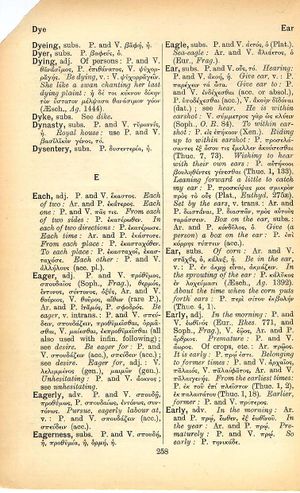early: Difference between revisions
οἷς πρόθεσίς ἐστιν ἀδικεῖν, παρ' αὐτοῖς οὐδὲ δικαία ἀπολογία ἰσχύει → not even a just excuse means anything to those bent on injustice | the tyrant will always find a pretext for his tyranny | any excuse will serve a tyrant
mNo edit summary |
mNo edit summary |
||
| Line 7: | Line 7: | ||
<b class="b2">Belonging to former times</b>: P. and V. [[ἀρχαῖος]], [[παλαιός]], V. [[παλαίφατος]], Ar. and V. [[παλαιγενής]]. | <b class="b2">Belonging to former times</b>: P. and V. [[ἀρχαῖος]], [[παλαιός]], V. [[παλαίφατος]], Ar. and V. [[παλαιγενής]]. | ||
<b class="b2">From the earliest times</b>: P. ἐκ τοῦ ἐπὶ πλεῖστον (Thuc. <b class="b2">1, 2</b>), ἐκ παλαιτάτου (Thuc. 1, 18). | <b class="b2">From the earliest times</b>: P. ἐκ τοῦ ἐπὶ πλεῖστον (Thuc. <b class="b2">1, 2</b>), ἐκ παλαιτάτου (Thuc. 1, 18). | ||
[[earlier]], [[former]]: P. and V. [[πρότερος]]. | |||
'''adv.''' | '''adv.''' | ||
Revision as of 17:56, 24 February 2019
English > Greek (Woodhouse)
adj.
In the morning: P. and V. ἑωθινός (Eur., Rhes. 771, and Soph., Frag.), V. ἑῷος, Ar. and P. ὄρθριος. premature: P. and V. ἄωρος. Of crops, etc.: Ar. πρῷος. It is early: P. πρῴ ἐστι. Belonging to former times: P. and V. ἀρχαῖος, παλαιός, V. παλαίφατος, Ar. and V. παλαιγενής. From the earliest times: P. ἐκ τοῦ ἐπὶ πλεῖστον (Thuc. 1, 2), ἐκ παλαιτάτου (Thuc. 1, 18). earlier, former: P. and V. πρότερος.
adv.
In the morning: Ar. and P. πρῴ, ἕωθεν, ἐξ ἑωθινοῦ. In the year: Ar. and P. πρῴ. premature: P. and V. πρῴ. So early: P. τηνικάδε.

